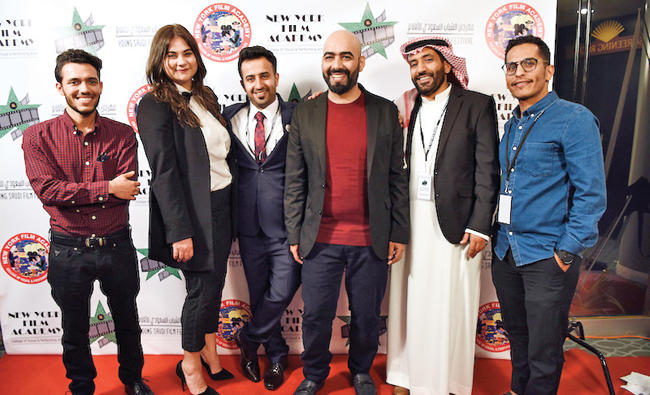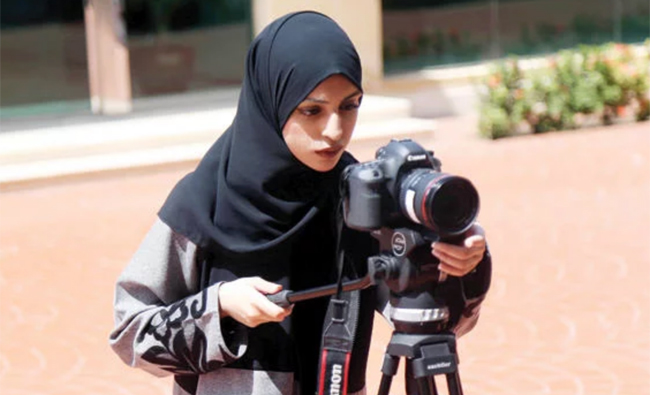JEDDAH: As a long-standing supporter of Saudi Arabia’s creative community, the New York Film Academy (NYFA) is excited and inspired by the many talented young Saudi filmmakers it has educated over the past seven years.
NYFA recently hosted the second annual Young Saudi Film Festival (YSFF) in Los Angeles, California, in order to showcase a number of Saudi filmmakers including NYFA screenwriting student Meshal Al-Jasser, the recent Qomra award-winner for his film “Under Concrete.”
The highly anticipated event was attended by NYFA students and alumni, local Saudis, producer, and film distributor Diane Taren, and representatives from the Kuwaiti and Emirati consulates.
Speaking to Arab News, NYFA President Michael Young said: “NYFA is a global institution that annually brings students from nearly 100 countries to learn, create, and share the richness of their cultures together. The academy’s Saudi students are highly motivated to tell their stories and undoubtedly they will help shape the future of the Kingdom’s entertainment industry.”
Tami Alexander, NYFA’s dean of enrolment services, regularly visits the Kingdom. Recently she oversaw workshops in partnership with the Prince Mohammed bin Salman bin Abdul Aziz Philanthropic Foundation (MiSK) and Colors of Saudi under the guidance of the Saudi Commission for Tourism and National Heritage (SCTH).
Alexander consistently holds events including auditions, portfolio reviews and information sessions around the Kingdom. “In my role at NYFA, I have visited many cities including Riyadh, Taif and Dammam to scout the most talented Saudi nationals, encourage them to pursue their passion and come and study at the Academy,” she said.
“As Saudi Arabia opens its cinemas in 2018, I am extraordinarily excited for the days when I will be sitting in movie theaters in the Kingdom watching local Saudi films, many of which I expect will be made by graduates of NYFA.”
She added that NYFA looks forward to being a part of the future of Saudi Arabia’s expansion of entertainment and a burgeoning film industry, and hopes to continue to provide training for the region’s industry-standard media and entertainment professionals.
“We have had over 300 Saudi students study with us at many different levels,” she said.
Other successful Saudi NYFA alumni include Fahad Al-Joudi, who has won various awards for his film “Arabian Swan,” and Ahd Kamel, currently starring in the Netflix show “Collateral.” Aymen Khoja premiered his first feature film, “Arabian Warrior,” which was shot during his final semester at NYFA, in Dubai on March 12. He told Arab News: “I wouldn’t have been able to achieve what I did without the knowledge I gained from NYFA. I look forward to seeing my film in cinemas in Saudi Arabia very soon.”
And there is Almotaz Al-Jefri, who alongside the New Media Center at the Ministry of Culture and Information, directed and produced “Wahi 360,” a virtual-reality project about Makkah that was screened last year during King Salman’s visit to Russia.
Talking about the welcoming attitude of NYFA’s faculty, Al-Jefri said: “NYFA has offered me the experience and enhanced my level of knowledge through observational and practical opportunities. These opportunities and experiences have given me the confidence to create projects combining culture and production.”
Many other NYFA alumni have been involved in the Kingdom’s local film and television industries.
This year the YSFF festival grew in audience and scope, receiving more than 80 submissions and featuring eight outstanding films that told stories ranging from comedy to tragedy.
With the ban on movie theaters lifted in Saudi Arabia, it is a great time to showcase the next generation of Saudi filmmakers.
On March 1, Saudi Arabia started issuing licenses for cinema operators in the Kingdom.
Cinema is one of several new avenues for Saudi women, who can now take part in sport, attend soccer matches and, in a few months, will be allowed to drive cars.
By 2030, the Saudi authorities are expecting to open 300 cinemas with 2,000 screens around the Kingdom. By creating opportunities for youngsters they aim to build a huge industry that will contribute more than SR90 billion ($24 billion) to the economy and create 30,000 jobs.

Saudi filmmakers pose with the NYFA officials at the end of Young Saudi Film
In 2015, only one documentary film from Saudi Arabia, about Jeddah, was presented at the International Film Festival Manhattan in New York City. Directed, edited and produced by former NYFA student Jameelah Rose del Prado, “Historic Jeddah” is a multi-part documentary short film that showcased aspects of Saudi Arabia’s cultural heritage such as the Dondurma, Rawashin and Rubat.
At that time, Jameelah said this documentary film would contribute to Saudi Arabia’s tourism in the near future. “This country has so much to offer but it is not widely known to the rest of the world.”
In an interview with NYFA in 2016, Jameelah said: “As a pioneer, I hope I am able to contribute to Saudi Arabia’s promising future in the field of cinema. I also hope I can give rise to aspiring Saudi filmmakers to do the impossible, break stereotypes, and to not shy away from adversities.”
In 2016, Jameelah also directed a sequel documentary called “Our Journey to Hijaz” and “Third Culture Kids of Saudi Arabia.”
In 2018, six films from Saudi Arabia became huge successes at YSFF. The short films range from five to 20 minutes in length, and cover a wide range of genres.
During the closing ceremony of YSFF, Director of NYFA’s Los Angeles campus Dan Mackler emphasized how storytelling is a universal means of uniting different cultures: “The New York Film Academy believes that storytelling unites us internationally, across cultures and through perceived differences. We’re very proud of the films we’re screening because they exemplify those ideals.”
Rakan Anneghaimshi, president of the YSFF and student at the New York Film Academy, said: “We try, as much as possible, to reflect society as we see it. We want to see authentic stories coming out of our community.”
“One of the goals of the YSFF was to help bring our global community together. We had comedic films, we had dramatic films, and we had family-oriented films. I couldn’t be more proud.
“In an interview in 2017 on Saudi TV channel 1, I said ‘I am on scholarship now; I study acting at the New York Film Academy because I believe the Kingdom will reopen cinema.’ I saw this coming and I am not surprised by the announcement that cinemas in the Kingdom are reopening.”

He added: “As an actor, it was hard for me to keep myself motivated and positive. I had many people ask me, ‘Why would you study acting for film? There is no cinema in Saudi Arabia.’ Regardless of what the future holds, I wanted to be able to work in Hollywood and had hopes of working in my home country.
“I believe Saudis have the talent and the love of art. I believe that Saudis and non-Saudis should get an opportunity to see us perform our craft and watch our performances. Now that cinema is back again, I look forward to my next movie on a billboard in my lovely country of Saudi Arabia.”
James Rowe, NYFA instructor and one of the judges of the competition, attributed the great stories coming out of Saudi Arabia to a need humans have to share their experiences.
“Great art is born out of urgency,” Rowe said. “There is a burning need to tell stories that have gone untold for some time. There exists a desire to express ideas that have remained unspoken.
“Submissions to this festival have come from all over the world. We were looking for stories and perspectives that surprised us and left us feeling something long after the credits had rolled.”
Rowe added: “All of the films clearly have something to say. They are a reminder that art captivates and compels us most when it feels urgent — as if the artist couldn’t have waited one more moment to tell us their story.”
The short films screening at this year’s festival were: “Bloodline,” written and directed by Saud Al-Moghirah, produced by Javier Olmo; “Eternity,” written and directed by Mohamed Makki, produced by Mohamed Makki and Mohamed Obaidullah; “Hero Complex,” written and directed by Mohamed Al-Yamani, produced by Mohamed Al-Yamani and Douglas Spain; “The Nostalgia,” written by Sarah Lotfy, directed and produced by Moataz Badran; “Piece of Wood,” by Yassin Koptan; “The Scapegoat,” written by Charlie Millen and Stephen Ranieri, directed by Talha B., produced by Maan B; “Spirit of North,” by Mohamed Ali Al-Marhabi; and “Under Concrete,” by Meshal Al-Jaser.
Recently, the Saudi Art Council, in partnership with the American Film Showcase, brought together local and international experts in Jeddah to share their opinions about what needs to be done for the Kingdom’s cinema industry.
The experts agreed that there is a need of law infrastructure for the cinema, so people can be directed in the right direction. “Making films is a process of reducing damage because there is so much that can go wrong,” said Hisham Fageeh, who co-produced “Barakah Meets Barakah,” a film submitted for consideration in the best foreign language film category at the Oscars in 2016.
The NYFA is proud to be listed as a recommended school by Saudi Arabia’s Ministry of Higher Education. It’s considered the best hands-on film school in the world by many of the industry’s top filmmakers, and its pedagogy is designed for a new generation of 21st-century storytellers.
NYFA programs balance rigorous academics with practical application to train students to tell compelling visual stories and develop their skills to the fullest extent possible.
At NYFA, under the guidance of an esteemed faculty of award-winning filmmakers who are all working industry professionals, many ambitious young Saudi filmmakers learn to operate industry-standard equipment and software while working in the school’s state-of-the-art facilities, including on a major Hollywood studio back lot.














